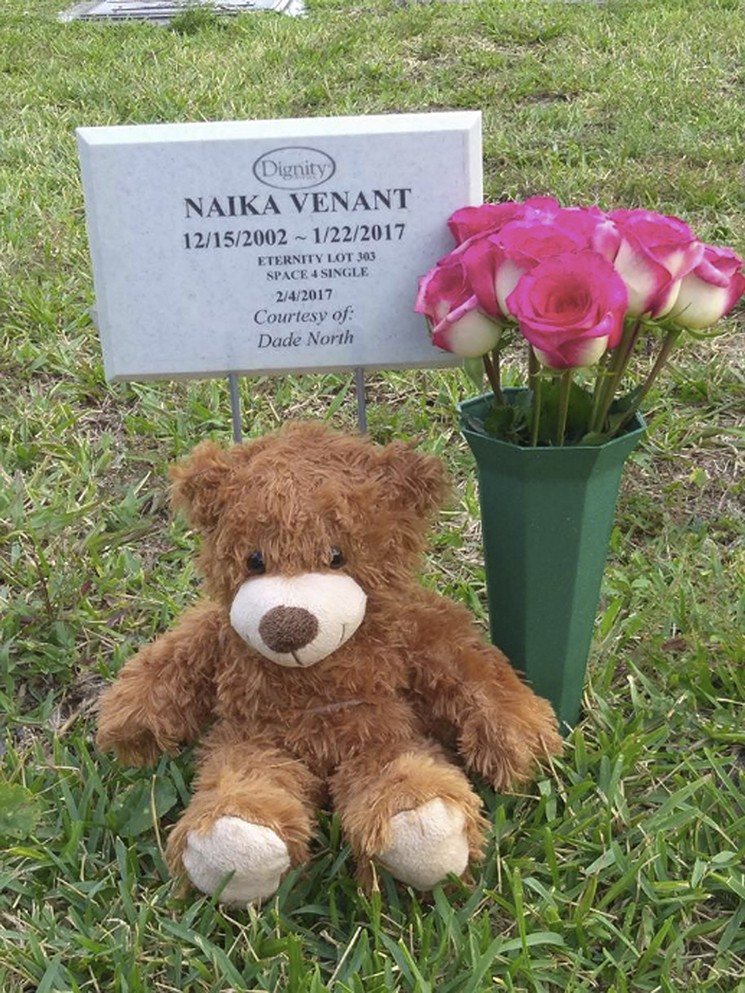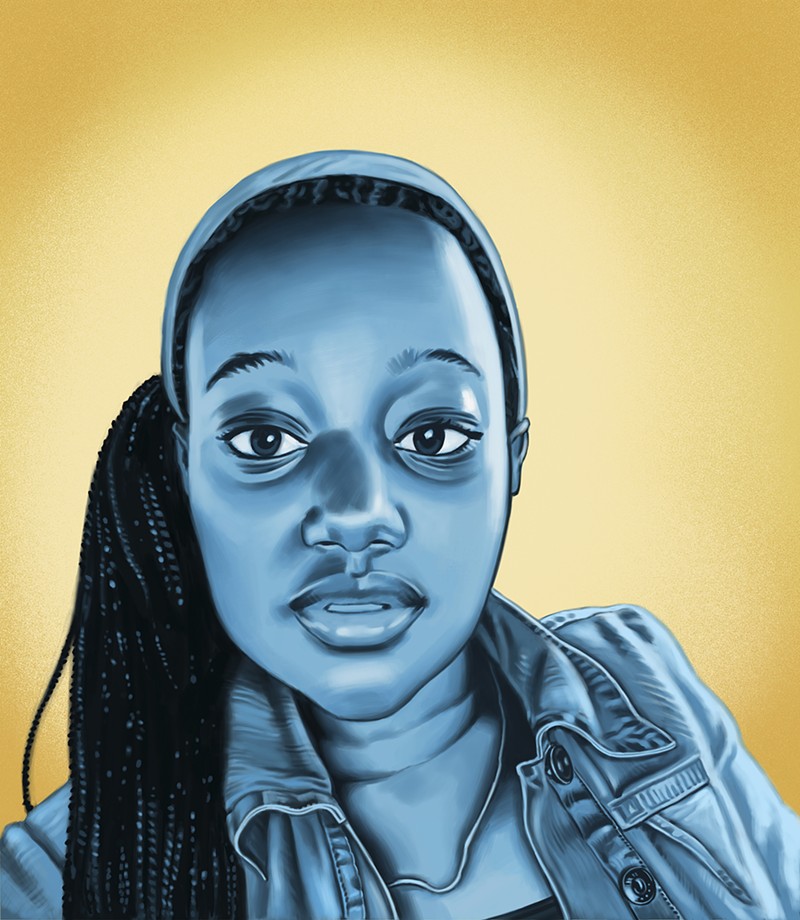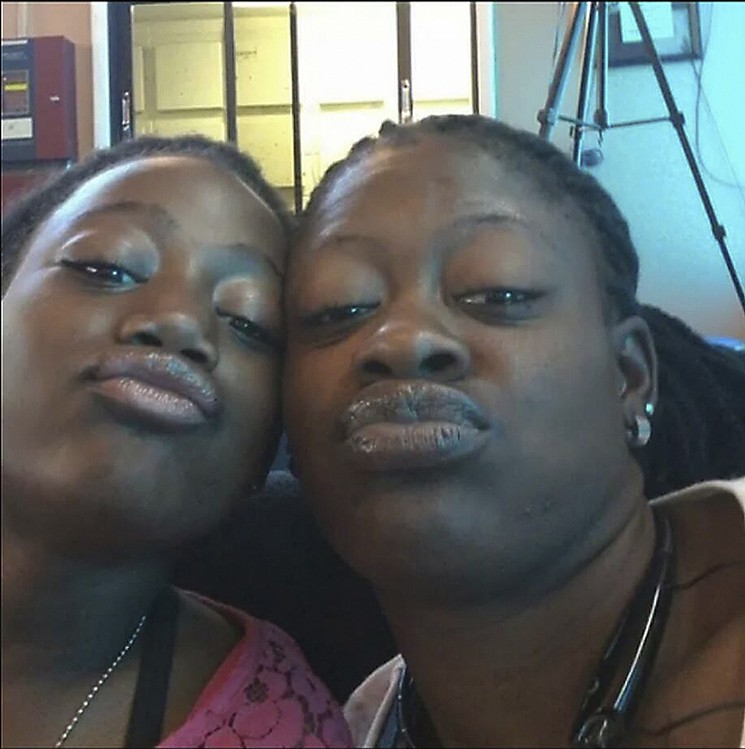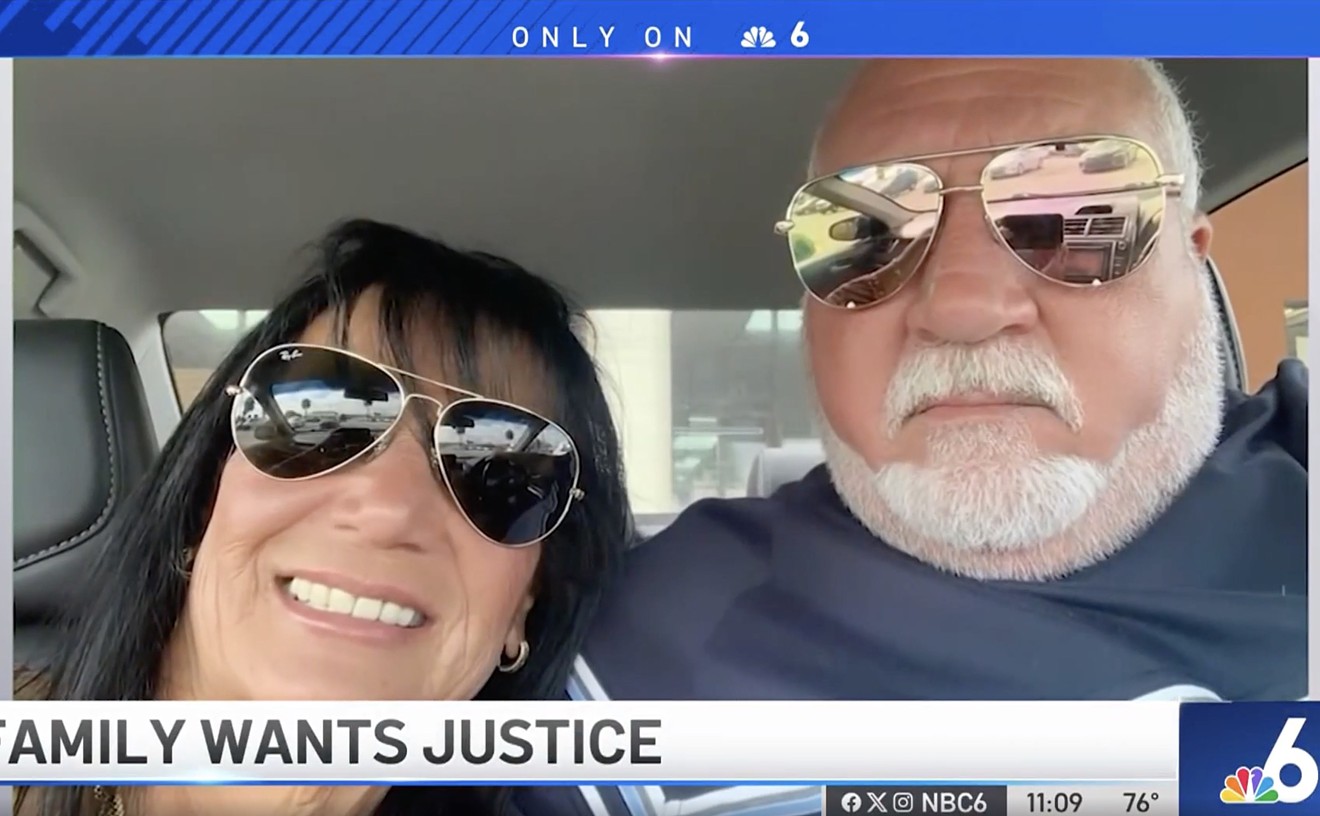Still dressed in her school uniform, Naika Venant went live on Facebook at 6:12 p.m. November 10, 2016. Earlier that day, the 13-year-old foster child from Miami had stolen a phone from her caseworker. Now, as an audience of three watched her video feed, she clumsily navigated the iPhone's camera, flipping through filters before settling on one in black-and-white.
"The regular one is ugly as hell," she complained.
Someone commented about seeing her in handcuffs at school three days earlier, so Naika explained how she had been committed to a mental-health facility after running into traffic when a teacher tried to search her bag for marijuana.
"They said I walked in front of cars. And I ain't go to jail — they Baker Acted me," she clarified. "They put me in the crazy house for the people who want to kill
During her eighth-grade year, Naika spent hours documenting her life on Facebook Live. With her tough exterior and class-clown quips, it was easy for her to dismiss concerns that she was depressed or suicidal. But already in her short life, Naika had expressed thoughts of self-harm on at least five occasions and been hospitalized three times under the Baker Act, a state law that allows officials to detain anyone threatening to hurt themselves.
From the age of 6, she had been in and out of Florida's foster-care system after the state received a report that her mother had whipped her with a belt more than 30 times. Since then, records show Naika had been sexually abused, psychologically evaluated, hospitalized for sickle cell anemia, diagnosed with anxiety and posttraumatic stress disorders, medicated with Adderall and Zoloft, arrested for criminal mischief, and expelled from her charter school.
The trauma she experienced and the behavioral problems she exhibited were well known to the child-welfare agencies responsible for her care. But despite being under the watchful eye of dozens of doctors, therapists, foster parents, and caseworkers, Naika received no meaningful intervention. Instead, the system continued to lead her down a dangerous path, shuffling the teen to more than a dozen foster homes in the last eight months of 2016. It was in one of those homes that she entered the bathroom, logged into Facebook, and hanged herself while filming her final live-stream.
"Trafficking and trauma, the opioid epidemic... are really having a profound impact on kids."
tweet this
Naika's death on January 22, 2017, led to national outrage, finger-pointing among agencies, and leadership shake-ups within Our Kids, the Miami-based contractor responsible for her foster-care placements. Attorneys acting on behalf of Naika's estate — which includes her allegedly abusive mother — have now filed suit against Our Kids, the Florida Department of Children and Families (DCF), five other child-welfare agencies, and two of Naika's foster parents. Most damning, the lawsuit claims Naika's civil rights were violated when she was housed in multiple inappropriate foster placements, which denied her the safety and stability she required — ultimately leading to her tragic and untimely death at the age of 14.
"We are hoping to obtain justice for the emotional anguish that Naika suffered as a result of her sexual abuse in foster care and the failures of the Miami-Dade child protection system that bounced her in and out of 16 inappropriate placements during the last eight months of her life," says attorney Stacie Schmerling of Talenfeld Law, a children's advocacy firm that filed the case.
A DCF spokeswoman declined to comment on the pending lawsuit. Our Kids CEO Michael Williams, who joined the organization five months after Naika's death, also said he could not respond to questions specifically about the case. But in an interview with New Times, he acknowledged agencies throughout Florida have had trouble placing children who need specialized medical or mental-health care.
"Trafficking and trauma, the opioid epidemic — all those things are really having a profound impact on kids and the adolescents and teens," Williams said. "Trying to find the right clinical set of services to meet their needs is a challenge everyone is facing across the state."
Naika Marie Venant was born in 2002 to 17-year-old Gina Caze in Port-au-Prince, Haiti. Shortly after giving birth, Caze moved to Florida, leaving behind her daughter with the baby's grandmother. Naika would be 18 months old before she was reunited with her mother in the United States.
By DCF's account, Naika's early years in Florida were marked by instability and abuse. At 4 years old, she
Her caseworkers believed that exposure was one reason the girl repeatedly engaged in inappropriate sexual behavior with other children. In 2009, when Naika was 6, DCF received an abuse hotline report that she had been inappropriately touched by a classmate at school. An investigation revealed Naika had also engaged in sexual activity with another student, according to the lawsuit.
Although her foster parents were supposed to implement a sexual-safety plan that involved near-constant supervision, her attorneys say that didn't happen. At one foster home in 2009, she engaged in child-on-child sexual activity with her foster mother's son while the two were unsupervised. Throughout the year, according to the lawsuit, she was repeatedly sexually assaulted by a foster boy more than twice her age. (A DCF report says the boy denied assaulting Naika and claimed she was the aggressor.)
At the same home, Naika's foster mother allegedly used physical discipline, on one occasion "resulting in
During this time, she was misbehaving at school and demonstrating sexually reactive behaviors, such as exposing herself to classmates, Naika's attorneys say. In June 2010, she received her first psychosexual evaluation, where the assessor determined she needed specialized treatment for sexually abused children. While being examined, Naika also expressed thoughts of self-harm and suicidal ideations. She was only 7 years old.
Later that month, she was reunified with her biological mother with the idea that Naika would continue to receive court-ordered behavioral and mental-health services. But the lawsuit says that by then, her behavior had grown so bad that Caze could no longer care for her. After running away from home, Naika was placed back in foster care for two months in 2014 and then again for a third time beginning in April 2016. She would remain in state care until the day she died.
Naika expressed sadness that her mother "didn't want her back."
tweet this
In the last months of her life, Naika went from earning A's and B's in school to flunking two of her classes, including math, her best subject. She was diagnosed with major depression and placed on an increased dosage of Zoloft. On January 7, two weeks before her death, she was hospitalized for sickle cell complications and expressed she "did not want to die," according to the lawsuit.
In a conversation with her caseworker days before her death, Naika expressed sadness that her mother "didn't want her back" and that she would soon age out of the foster system, according to a report issued by DCF in response to her death. But Naika also talked positively about her plans to graduate from high school and start college.
In the report, DCF noted that Naika's "poor familial environments," including her multiple placements and home life with her mother, were a key suicidal risk factor. The agency also faulted Naika's Facebook followers for "urging her to take her own life, calling her vile names, and claiming the situation was either 'fake' or 'all an act.'" The report then cited a comment Caze allegedly posted on her daughter's final live-stream:
"Using the screen name 'Gina Alexis,' the following statement was allegedly written by Naika's mother in the moments leading up to her daughter's death: #ADHD games played u sad little DCF custody jit that's why u where u at for this dumb shit n more u keep crying wolf u dead u will get buried life goes on after a jit that doesn't listen to
It appears from the report that DCF did not verify whether the comment actually came from Naika's mother. Caze did not respond to an interview request from New Times, but in prior
"I didn't taunt her — I didn't know what she was even doing yet — I thought it was a hoax because when I saw it, other people were saying it was fake, so I did too," Caze told FloridaPolitics.com.
"I still haven't seen the [video] stream to this day. In the comment, I don't see a mother saying, 'Do it,' I see a mother saying, 'Don't — stop,' because here's the reality of what can happen if she did do it, and what she needed to be doing instead of playing with Facebook males and females — stick to your books."

In the same report from DCF, the state acknowledged a shortage of therapeutic foster homes at the time of Naika's death. Unsurprisingly, foster-care placement is a major theme of the new lawsuit. According to the complaint, the ink was barely dry on Majorie Janvier's foster-care license when Our Kids assigned Naika to move into Janvier's two-bedroom apartment in Miami Gardens. Records show DCF issued Janvier's license December 19, 2016; she was given Naika and two other foster children just two days later.
The lawsuit says Janvier, who had a 15-month-old son, had no experience as a foster mother and had never parented more than one child at a time. She also wasn't equipped to take in a teenager like Naika, who had been diagnosed with sickle cell anemia.
In Florida, foster children with serious medical or emotional needs are supposed to be placed in therapeutic foster homes where they can receive specialized care. Therapeutic foster parents complete 30 hours of initial clinical training, plus eight to ten hours of training every six months, and must be available 24 hours a day to respond to crises. They are supported by a treatment team of health-care professionals, including a physician and a psychiatrist.
Naika's attorneys argue she should have been in a therapeutic foster home all along. And they say it was clear she required special attention from the time she entered the foster-care system. Instead, the lawsuit suggests Our Kids repeatedly placed Naika in traditional foster homes because there was a shortage of therapeutic parents.
Our Kids CEO Michael Williams says that theory is an assumption that has yet to be proven. But he points out that an agency such as Our Kids has little authority to recruit more therapeutic foster parents. In Florida, therapeutic foster homes are overseen by Medicaid, not by DCF or its independent contractors. That was news to Williams, who came to Our Kids from Connecticut's Department of Children and Families.
"The difference is, in Connecticut, we had control of our therapeutic foster-care system," he says. "We managed it, we grew it, we regulated it, so we could blend it in our recruitment efforts with our regular foster care."
"A regular foster parent wouldn't know what to do with a child like her."
tweet this
The DCF report issued in the wake of Naika's death says behavioral-health providers — which are independent organizations that serve children with disabilities and mental-health needs — are typically responsible for recruiting therapeutic foster parents. But the state suggested Our Kids should take a more active role by recommending good candidates.
In February 2017, one month after Naika died, DCF found that Our Kids had 25 children on a waitlist for specialized therapeutic foster homes. Three-quarters of those kids were 13 or older.
Many of them were waiting to be moved from one therapeutic placement to another due to "disruption." Behavioral issues were a key factor in Naika's case too: DCF records show disciplinary problems made it difficult for Our Kids to find her a stable foster home.
At least five of Naika's foster parents complained they could not handle her, and she was kicked out of group homes at least three times. In 2016, she was reassigned to 16 foster placements, including five where she stayed only one night, the lawsuit says. Janvier's apartment in Miami Gardens would be her last home.
Evin Daly, a guardian ad litem and former chief operating officer of the Family Resource Center of South Florida — a case-management agency licensed by Our Kids — says there's no way Naika should have been placed with a new foster parent like Janvier, let alone in a home with multiple other foster children.
"Children with behavioral problems who are runaways and have sexualized behaviors really need a one-on-one placement," he says. "A regular foster parent wouldn't know what to do with a child like her."
Because of the improper placement, Daly says Our Kids ultimately shares responsibility for Naika's death. But he also acknowledges the challenges foster-care agencies face in finding qualified homes for children with behavioral problems.
"It's easy to place a baby; it's hard to place an unruly teen," he says. "The placement was
(Janvier did not respond to a request for comment from New Times.)
Ultimately, Daly says he sees Naika's death as the tragic result of a girl abandoned by her mother and a broken foster-care system that has yet to be fixed.
"At the end of the day, it's a little girl who's never going to live a life now," he says. "I wish there was a happy ending for these kids, but there's not."














